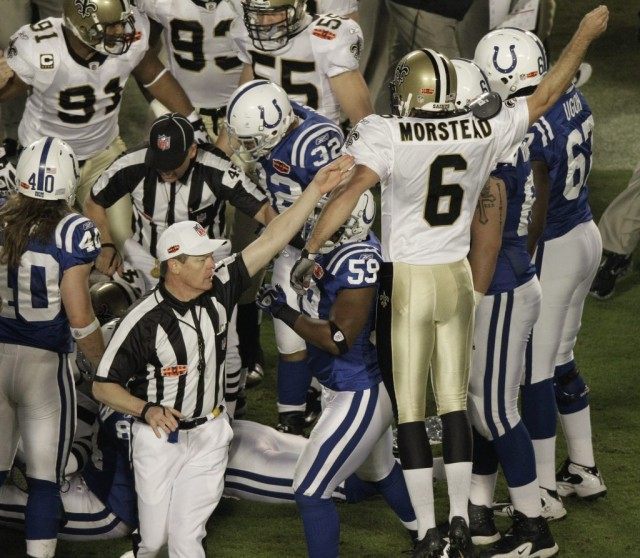It’s still called football. But the National Football League works feverishly to ensure that the game less resembles its name.
“We’re not at the point where we want to take the kickoff out of the game completely, although we may be moving in that direction,” Giants owner John Mara, a member of the competition committee, confessed this week to Giants.com. “One of the concerns is what do you do in a situation where you’ve scored late in the game and you’re down by less than a touchdown, and it takes away the onside kick. As I say, you could very well see the kickoff eliminated at some point in time in the future, but I don’t think we’re at that point yet.”
The point the NFL arrived at this winter is the 25-yard line. That’s where referees spot the ball after a touchback next season.
“The theory there was that the kickoff return remains the most dangerous play that we have in the game, has the highest rate of concussions,” Mara explained. “You see more and more returners bringing the ball out from eight or nine yards deep. The hope is that if they’re catching the ball that deep in the end zone, knowing that they’re going to automatically get it at the 25, maybe that would discourage them from coming out.”
Alternatively, maybe the kicking team deems it dangerous to kick it into or past the end zone. Punters hold back when booting the ball from the opposing team’s 40. Why wouldn’t kickers hold back if a touchback no longer represents an award for the kicking team?
The rule change follows last year’s shift in point-after touchdowns from the 2-yard line to the 15. While this change made a perfunctory play a competitive one, voices called, and still call, to eliminate extra-point kicks entirely. In 2011, the NFL pushed kickoffs from the 30 to the 35, which transformed one of he most exciting plays into an afterthought by enabling kickers to more easily prevent a return.
“It still does remain an exciting play,” Mara notes, “but it’s also a dangerous play. Obviously concussions are on the top of our list in terms of our concerns for the game going forward.”
Football’s founding fathers saw this coming.
“It has been brought out many times already that injuries are more frequent in the open plays than in the so-called close formations,” Walter Camp, a devotee to the old gridiron game so pure that he resisted the forward pass, noted. “That cannot but be apparent even to the ordinary spectator, for, as he looks out over the field and sees a man running unprotected by his fellows and another coming charging down upon him, as, for instance, in the running back of a punt or a kick-off…”
But even the purist Camp, correcting the misguided criticisms of grinding interior run plays as especially dangerous, ushered in rules that dramatically altered football. He pushed downs from scrimmage to replace the scrum, invented the two-point safety to kill “trap” game stalemates, and helped transition teams from fifteen to eleven men.
Many of the early rules eroded the importance of the kicking game. Early football awarded points on a touchdown only on the successful completion of a subsequent kick and for most of the nineteenth century privileged field goals over touchdowns in scoring. The game started with a round ball like soccer, which quickly morphed into rugby’s prolate spheroid at the request of Harvard over Yale’s objection. A soccer goal served as the ball’s intended destination until players erected uprights upon it (that’s where the “H” goalpost comes from) when they decided they preferred kicking above rather than below the bar. Rule changes downgraded the primacy of kicking, and safety sometimes served as the rationale—e.g., Camp spearheading the abolition of the flying wedge after rivals used it effectively against Yale—for changes in special teams plays. But it’s been a long, strange trip for a game calling itself football to reach the point when a representative of one of the NFL’s oldest families discusses the possibility of eliminating kick offs entirely and the sport’s commissioner raises the notion—dormant if not dead for now—of abolishing point-after touchdowns.
Football’s a game of violence and change. It’s more often than not the violence that ultimately brings about the change. Walter Camp understood that. John Mara understands it, too. But it’s not likely that the two men would understand each other—or the particular brand of football they devoted their lives to.

COMMENTS
Please let us know if you're having issues with commenting.